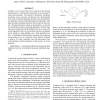Free Online Productivity Tools
i2Speak
i2Symbol
i2OCR
iTex2Img
iWeb2Print
iWeb2Shot
i2Type
iPdf2Split
iPdf2Merge
i2Bopomofo
i2Arabic
i2Style
i2Image
i2PDF
iLatex2Rtf
Sci2ools
101
Voted
ICASSP
2008
IEEE
2008
IEEE
Anti-jam distributed MIMO decoding using wireless sensor networks
Consider a set of sensors that wish to consent on the message broadcasted by a multi-antenna transmitter in the presence of white-noise jamming. The jammer’s interference introduces correlation across receivers and destroys the decomposable form of the maximum-likelihood decoder, thus preventing direct application of known distributed detection algorithms. This paper develops distributed detectors that circumvent this problem. Treating the jammer signal as deterministic, we develop two distributed estimation-decoding algorithms. The first algorithm relies on the generalized likelihood ratio test, whereas the second algorithm relies on semi-definite relaxation techniques and is suitable for large alphabet sizes. Both algorithms feature: (i) distributed implementation requiring only single-hop communications; (ii) no constraints on the network topology so long as it is fully connected; and (iii) performance close to the optimum centralized detector in the presence of severe jamming....
Algorithm Relies | Distributed Estimation-decoding Algorithms | ICASSP 2008 | Signal Processing | first Algorithm Relies |
Related Content
| Added | 30 May 2010 |
| Updated | 30 May 2010 |
| Type | Conference |
| Year | 2008 |
| Where | ICASSP |
| Authors | Shahrokh Farahmand, Alfonso Cano, Georgios B. Giannakis |
Comments (0)

